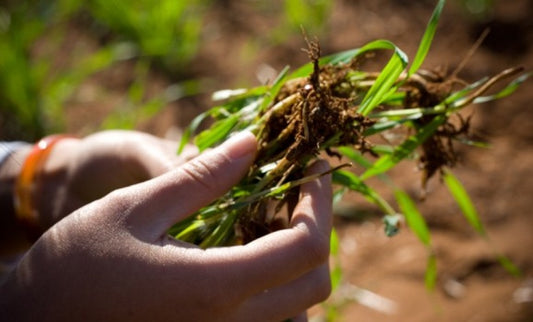 Planting one crop in the same place year after year is a monoculture, which can create nutrient deficiencies. Different plants pull different nutrients from the soil for optimum growth. For example, broccoli uses a lot of nitrogen. The soil will exhibit a nitrogen deficiency if broccoli is planted repeatedly in the same spot. The natural response is for gardeners to use excessive fertilizer to feed their plants. Pests and diseases also thrive in a monoculture, because they continually have the perfect conditions they need to live. Squash bugs overwinter in the debris in your squash bed, and they will return in the spring in greater numbers, eventually destroying your plants and transmitting diseases. A gardener will resort to pesticides to combat pest infestations such as this. Crop rotation and cover cropping are two important facets of organic gardening. They add nutrients to the soil and improve its structure, reducing insects and disease. By creating a polyculture with several different crops, you increase your garden’s biodiversity, and attract pollinators and other healthy critters above and below the soil. With better soil, nutrients, and diversity, you increase your yields and your food is more nutritious. Rotate plant families at least every three years to allow the soil to replenish itself and to give insects and diseases time to die off naturally. Here is a list of plant families from Mother Earth News:
Planting one crop in the same place year after year is a monoculture, which can create nutrient deficiencies. Different plants pull different nutrients from the soil for optimum growth. For example, broccoli uses a lot of nitrogen. The soil will exhibit a nitrogen deficiency if broccoli is planted repeatedly in the same spot. The natural response is for gardeners to use excessive fertilizer to feed their plants. Pests and diseases also thrive in a monoculture, because they continually have the perfect conditions they need to live. Squash bugs overwinter in the debris in your squash bed, and they will return in the spring in greater numbers, eventually destroying your plants and transmitting diseases. A gardener will resort to pesticides to combat pest infestations such as this. Crop rotation and cover cropping are two important facets of organic gardening. They add nutrients to the soil and improve its structure, reducing insects and disease. By creating a polyculture with several different crops, you increase your garden’s biodiversity, and attract pollinators and other healthy critters above and below the soil. With better soil, nutrients, and diversity, you increase your yields and your food is more nutritious. Rotate plant families at least every three years to allow the soil to replenish itself and to give insects and diseases time to die off naturally. Here is a list of plant families from Mother Earth News:
- Onion family: onions, garlic, leeks and shallots
- Carrot family: carrots, celery, parsley and parsnips
- Sunflower family: lettuce, sunflowers and a few other leafy greens
- Cabbage family (Brassicas): cabbage, broccoli, Brussels sprouts, kale and many other leafy greens, as well as rutabagas and kohlrabi
- Spinach family: beets and chard
- Cucumber family (Cucurbits): cucumbers, melons, squash and gourds
- Pea family (Legumes): peas and beans
- Grass family: corn, wheat, oats and rye
- Tomato family: tomatoes, peppers, eggplant and potatoes

- As you can see, it’s possible to do a nine-year rotation, but for the average home garden this isn’t necessary. You do want to avoid planting the same family in the same area for at least three years to cut down on insect and disease problems.
- For the most efficient use of nutrients, follow heavy feeders with nitrogen fixing legumes, then follow with leafy greens and other nitrogen lovers. Then begin the cycle all over again.
- Heavy feeders are plants in the cucumber and tomato families (from the list above). Follow those crops the second year with legumes (beans and peas), and in the third year, plant the cabbage family and leafy greens, which love nitrogen.
- Plants in the carrot and onion families can go anywhere in the rotation, because they do not have heavy nutritional needs. Follow with legumes.
- Don’t depend on crop rotation to take care of all your garden’s nutritional needs. It is one part of a complete organic gardening system. Add compost in spring, and plant cover crops in winter, especially for new beds. Use organic fertilizer when necessary.
- Rotation will not take care of all your pest problems, either. It will drastically cut down on them, but you will still need to watch for and take care of bugs and disease as you find them.
- Compost, cover crops, and crop rotation will help you grow a healthy, productive garden full of nutritious food!
Check out our 12 month guide to organic gardening.








